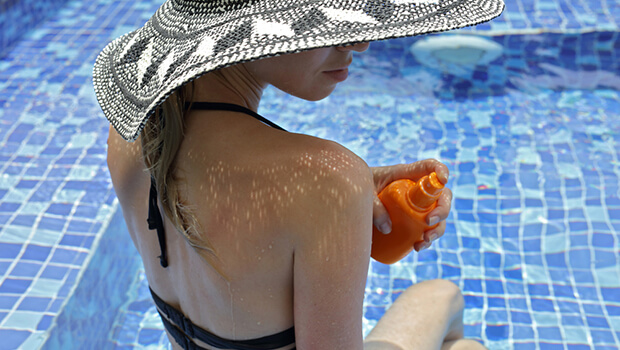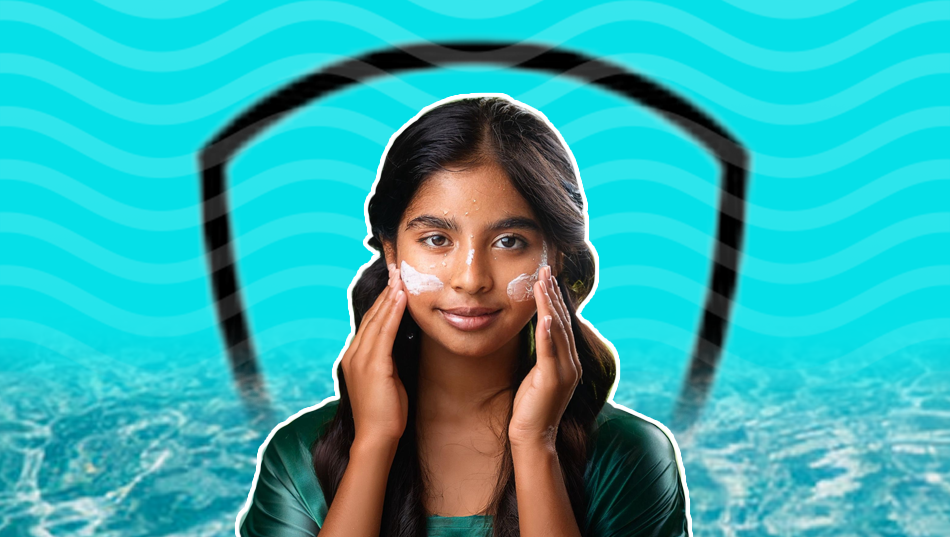How to Protect your skin from chlorinated water?
Table of Contents:
Whether you're an avid swimmer, a competitive athlete, or someone who enjoys a dip in the pool on a hot day, you've likely encountered the effects of chlorine on your skin. While chlorinated water plays a crucial role in keeping swimming pools clean and free from harmful bacteria, it can also take a toll on your skin. In this comprehensive guide, we'll explore how to protect your skin from chlorine, and ensure that your love for swimming doesn't come at the expense of your skin's health.
Understanding Chlorine's Impact on Skin
Before diving into the specifics of skin protection, it's essential to understand the chlorine effects on skin. Chlorine is a powerful disinfectant used in swimming pools to kill bacteria and other pathogens. However, it can also strip your skin of its natural oils, leading to dryness, irritation, and even rashes. For those with sensitive skin, the effects can be even more pronounced, causing redness, itchiness, and exacerbating existing skin conditions like eczema.
Pre-Swim Skin Care Routine

One of the most effective ways to prevent chlorine skin damage is to establish a solid pre-swim skin care routine. This routine can create a protective barrier between your skin and the chlorinated water, minimizing the damage.
1. Hydrate Your Skin:
Begin by moisturizing your skin with a thick, emollient-rich lotion. This helps to lock in moisture and creates a barrier that prevents chlorine from penetrating deeply into your skin. Best lotions for swimmers are those that are water-resistant and contain ingredients like shea butter, glycerin, and ceramides.
2. Apply a Pre-Swim Lotion:
Specialized pre-swim lotions are designed to protect your skin from chlorine and other swimming pool chemicals. These lotions form a barrier on your skin, reducing the absorption of chlorine and minimizing its drying effects. Look for products that specifically mention chlorinated water skin protection.
3. Use Sunscreen:
If you're swimming outdoors, don't forget to apply a broad-spectrum sunscreen. While this won't directly protect against chlorine, it will shield your skin from harmful UV rays, which can exacerbate the drying effects of chlorine. Opt for a water-resistant formula to ensure it stays effective while you're in the water.
Read our blog on Is Pre Swimming Lotion Important to Block Chlorine?
Protecting Your Skin While Swimming
Once you're in the pool, there are several steps you can take to further protect your skin from chlorine.
1. Wear a Swim Cap and Goggles:
These accessories can help protect your scalp and the delicate skin around your eyes from prolonged exposure to chlorinated water. For those with long hair, a swim cap can also prevent your hair from soaking up too much chlorine, which can lead to dryness and damage.
2. Rinse Off Frequently:
Taking short breaks to rinse your skin with fresh water during your swim can help wash away chlorine, reducing its contact time with your skin. This is especially important if you're swimming for an extended period.
3. Avoid Prolonged Exposure:
While swimming is great exercise, try to limit the amount of time you spend in chlorinated water. The longer your skin is exposed to chlorine, the more likely it is to become dry and irritated.
Post-Swim Skin Care Routine
Once you're out of the pool, it's crucial to implement a post-swim skin care routine to repair and hydrate your skin. This routine is just as important as the pre-swim care and can make a significant difference in how your skin feels and looks after swimming.
1. Shower Immediately:
As soon as you leave the pool, take a thorough shower with fresh, lukewarm water. This helps to rinse off any chlorine residue lingering on your skin. Use a gentle, hydrating body wash that doesn't strip your skin of moisture. Products containing aloe vera or oatmeal are excellent choices for soothing irritated skin.
2. Moisturize Generously:
After your shower, apply a rich, hydrating moisturizer to your entire body. Focus on areas that feel particularly dry or irritated. The goal is to restore the moisture that chlorine may have stripped away. Skin hydration after swimming is vital to prevent your skin from becoming flaky or itchy.
3. Soothe Irritation:
If you experience redness or irritation after swimming, use a soothing pre-swim lotions or post-swim shower gel containing ingredients like aloe vera, chamomile, or calendula. These ingredients can help calm the skin and reduce inflammation. For those prone to chlorine rash, this step is particularly important.
Preventing Chlorine Rash and Irritation
Chlorine rash prevention is a key concern for many swimmers, especially those with sensitive skin. Chlorine rash, also known as irritant contact dermatitis, can cause red, itchy bumps on the skin after exposure to chlorinated water.
1. Patch Test New Products:
If you're trying a new lotion or skincare product, perform a patch test before applying it all over your body. This can help you avoid allergic reactions or irritation, especially if you have sensitive skin.
2. Choose Hypoallergenic Products:
Opt for skincare products that are free from fragrances, dyes, and other potential irritants. Hypoallergenic products are less likely to cause a reaction, making them ideal for those with sensitive skin or a history of chlorine rash.
3. Wear a Rash Guard:
If you're prone to rashes, consider wearing a rash guard while swimming. This lightweight, protective clothing can reduce your skin's exposure to chlorine and other swimming pool chemicals, helping to prevent irritation.
Long-Term Skin Care for Swimmers

For regular swimmers, long-term skin care for swimmers is essential to maintain healthy, hydrated skin. Consistently following a protective skincare routine can help mitigate the cumulative effects of chlorine exposure.
1. Weekly Deep Hydration Treatments:
Incorporate a weekly deep hydration treatment into your routine. This can be as simple as applying a thick layer of a hydrating mask or using a moisturizing body oil. These treatments can help replenish the moisture lost during your swims and keep your skin soft and supple.
2. Exfoliate Gently:
Regular, gentle exfoliation can help remove dead skin cells and improve your skin's texture. However, avoid harsh scrubs, as they can further irritate skin that's already been exposed to chlorine. Instead, choose a mild exfoliant with ingredients like lactic acid or jojoba beads.
3. Monitor Your Skin's Condition:
Pay attention to how your skin reacts over time. If you notice persistent dryness, itching, or other signs of damage, consider adjusting your skincare routine or reducing the frequency of your swims. Consulting a dermatologist can also provide personalized advice and recommendations.
Additional Tips for Sensitive Skin
If you have sensitive skin, swimming in chlorinated water can be particularly challenging. Here are some sensitive skin swimming tips to help you enjoy the pool without compromising your skin's health.
1. Use a Barrier Cream:
Before swimming, apply a barrier cream designed for sensitive skin. These creams create a physical barrier on the skin, offering extra protection against chlorine and other irritants.
2. Consider Chlorine-Neutralizing Products:
Some products are specifically formulated to neutralize chlorine on the skin. These can be used during your post-swim shower to help remove chlorine more effectively, reducing the risk of irritation.
3. Opt for Saltwater or Ozone Pools:
If possible, choose to swim in pools that use alternative disinfection methods, such as saltwater or ozone. These options are gentler on the skin and can help reduce the risk of chlorine-related irritation.
Conclusion
Swimming is a fantastic way to stay fit and have fun, but it's essential to be mindful of the effects of chlorinated water on your skin. By following the tips and routines outlined in this guide, you can effectively protect your skin from chlorine, ensuring that your skin remains healthy, hydrated, and free from irritation.
Whether you're establishing a pre-swim skin care routine, focusing on post-swim skin care, or taking extra precautions for sensitive skin, these strategies will help you enjoy the pool without worrying about chlorine skin damage. Remember, the key to chlorinated water skin protection is consistency, so make these practices a regular part of your swimming routine.
With the right approach, you can swim confidently, knowing that your skin is well-protected against the potentially drying and irritating effects of chlorine. Dive in, enjoy the water, and let your skin stay as vibrant as your love for swimming.








